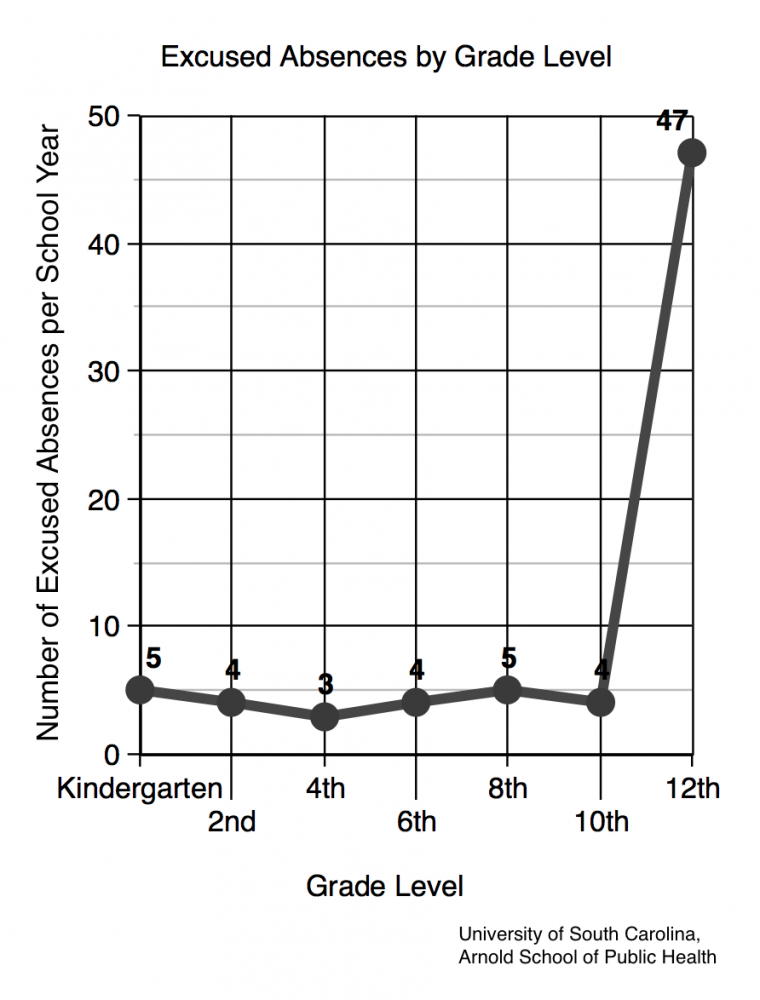Link discovered increase between tragic occurrences and becoming a second-semester senior
June 4, 2017
A new study released by researchers at the University of South Carolina’s Arnold School of Public Health found that the lives of seniors become dramatically worse the second that first semester finals are over, according to a study following 25494 high school students and their attendance clerks.
For years, The Council for Suddenly-Wretched High School Seniors and other advocacy groups have pushed for funding research into this phenomenon. Thanks to a grant from the Empower, a not-for-profit organization formerly known as Perpetually Late Slackers, researchers were able to identify links between becoming second-semester seniors and increases in spontaneously-appearing diseases, family issues, and car troubles.
Researcher Dr. Jenny Laurence, who led the team of seven scientists, began the study 13 years ago with around 25600 kindergarten students across America. To find her initial sample, she utilized a team of spies-for-hire, who broke into every public and private school, compiled a list of every single registered kindergarten student in America, and wrote the names down onto slips of paper. She then threw all the slips into the air and used a large butterfly net to catch the names of the students she would follow.
She and the other seven scientists have dedicated the past 13 years of their lives to the 25,600 students. Their report, which will be published in a really reputable scientific journal, included strong evidence that occurrences of fatal colds, vomiting, headaches, throat issues, and fainting spells increased as much as 843 to 854 percent from junior to senior year.
“It’s quite bizarre,” Dr. Matthew Doman, director of the National Institute of Science Stuff, said. “I’ve looked into their research, and they’ve gone above and beyond, actually ensuring that their subjects are actually ill, and the research seems to check out.”
Dressing as mail carriers, gardeners, and various backyard animals such as deer and field mice, the scientists fly across state lines almost daily to carefully observe the lives of their subjects.
Though it would seem impossible for the seniors to become more than nine times as ill as they were previously, those who called in sick or left school early did indeed seem to be sick. Rather than utilizing their time to study, which the researchers found was often the norm during junior year, the seniors instantly went to bed to sleep off their apparent illnesses, or laid down on couches to watch Netflix or played video games in bed, too weak to sit up.
The pattern continued for the other two most utilized excuses, including family issues and car troubles. On the days that seniors were late due to family issues, they appeared to leave the house for long periods of time, presumably to visit relatives at hospitals or attend funerals, and definitely not to hang out with their friends.
On the days that seniors called to report car troubles, it indeed appeared that their brakes were cut or at least severely messed-with, because they speeded all the way to school without ever slowing down, even for stop signs.
“We were astonished,” Dr. Laurence said. “It was surprising to find that seniors really are the sickest group, especially because they should be the healthiest out of all K-12 students. But we’re now fully convinced that they really do become sick, and aren’t just flaking.”
The next step is for the investigators is to attempt to determine the reason behind the sudden increase in miserable occurrences for senior students.
Dr. Laurence said that finding the cause has been her life’s mission.
“It’s absolutely despicable that so few so-called child rights groups care so little about seniors, who are apparently the most vulnerable demographic,” Dr. Laurence said, tearing up a little. “Right now, the reason can only be chalked up to magic or divine will. I won’t stop until I find out why their lives suck so bad.”










